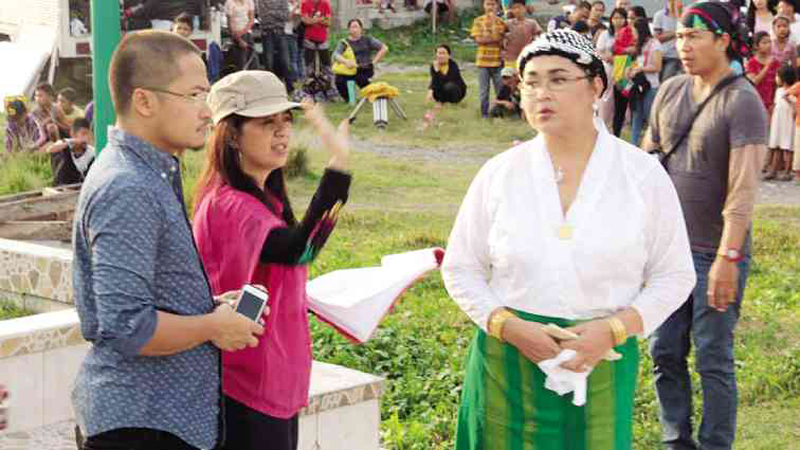Intrepid ‘newshen’ takes risks to tell urgent tales

ARLYN de la Cruz (center) directs Ping Medina and Elizabeth Oropesa on the set of “Maratabat.” INQSnap this page to view the video and join the Snap, Tap and Text promo!
Although she is more known as an intrepid journalist, Arlyn de la Cruz has embarked on a new and, by her own admission, daunting, adventure: filmmaking.
The lure of the movies has always been irresistible for De la Cruz. “I kept the passion hidden, locked deep in a special corner of my heart,” she confessed.
She hemmed and hawed for the longest time. “In 1995, I thought about it. In 2000, I almost did it. In 2009, I produced an independent film, ‘Puntod’ (directed by GMA 7 reporter Cesar Apolinario and top-billed by Kapuso teen star Barbie Forteza).”
This circuitous road led to “Maratabat,” a fictional place in Southern Philippines.
Big gamble
De la Cruz, who is anchor of the Radyo Inquirer program “Banner Story,” admitted that her directorial debut, “Maratabat,” was a huge gamble.
“I knew I was taking a risk, trying a new discipline at age 44, after 25 years as a broadcast journalist,” she said. “But I wanted to share this story—this time via a different medium.”
“Maratabat” is one of five entries in the Metro Manila Film Festival New Wave section. Entries in this section were screened prior to the festival proper and will have a week-long run in theaters next year.
De la Cruz’s movie tackles the armed conflict in Southern Philippines. “As a journalist covering Mindanao, I have lost count of violent incidents that I’ve witnessed,” she told the Inquirer. “But there is another side to this story—the message of peace.”
She sees her roles as filmmaker and journalist as intertwined. “Journalism is about truth and films strive for realism, too. My goal as a filmmaker is to strike a balance between fiction and reality.”
Complete trust
As if debuting as a director was not challenging enough, De la Cruz shot for seven out of 10 days in Maguindanao (three in Olongapo). Only one team member backed out, for security concerns.
“The rest of the cast and crew gave me their complete trust,” she related. She understood that a few had apprehensions about working in a place where journalists were massacred, “but curiosity and a shared interest in the project helped them overcome their anxieties,” she said.
The cast—led by Ping Medina, Julio Diaz, Richard Quan, Kristoffer King, Chanel Latorre and Elizabeth Oropesa—was a joy to work with, said De la Cruz. “As a first-time director, I could not ask for more. Everyone cooperated and worked with me as if I were an industry veteran. Everyone was professional and listened to my ideas.”
There was a dynamic and collaborative atmosphere on the set, she recounted. “We started as strangers [on the first shooting day] but it was clear that we had a common vision. We overcame the odds together and emerged as one team. I was blessed to work with a committed cast and crew on my first film,” she said.
Turning point
De la Cruz recalled a turning point on the set: “We were about to shoot a crucial scene… the burning of a village,” she said. “Everyone was ready, but my assistant director whispered to me that we didn’t have money to buy gas, to start the fire. I didn’t know whether to laugh or cry.”
The faint-hearted would have given up, but De la Cruz had an instant solution. “We borrowed diesel fuel from our gen-set (generator) operator.”
All these obstacles behind them, “Maratabat” was screened at Glorietta 4 and SM Megamall, Dec. 16 to 24.
“A big surprise,” she described her film’s selection as one of the five entries—along with Ato Bautista’s “Gemini,” Zig Dulay’s “M (Mother’s Maiden Name), Diane Ventura’s “Mulat” and Jason Paul Laxamana’s “Magkakabaung.”
Part of the incentives for the participants was the promise of a theatrical run, De la Cruz said.
“The MMFF committee secured an agreement with theater owners to give the five films screenings in 20 theaters next year,” she reported.
On her own, she plans to screen “Maratabat” in regular theaters in “the last quarter of 2015,” after making the rounds in the international circuit.
“Parts of the film’s journey, of course, are special, block or commercial screenings in Muslim Mindanao,” she said.
(bayanisandiegojr@gmail.com)